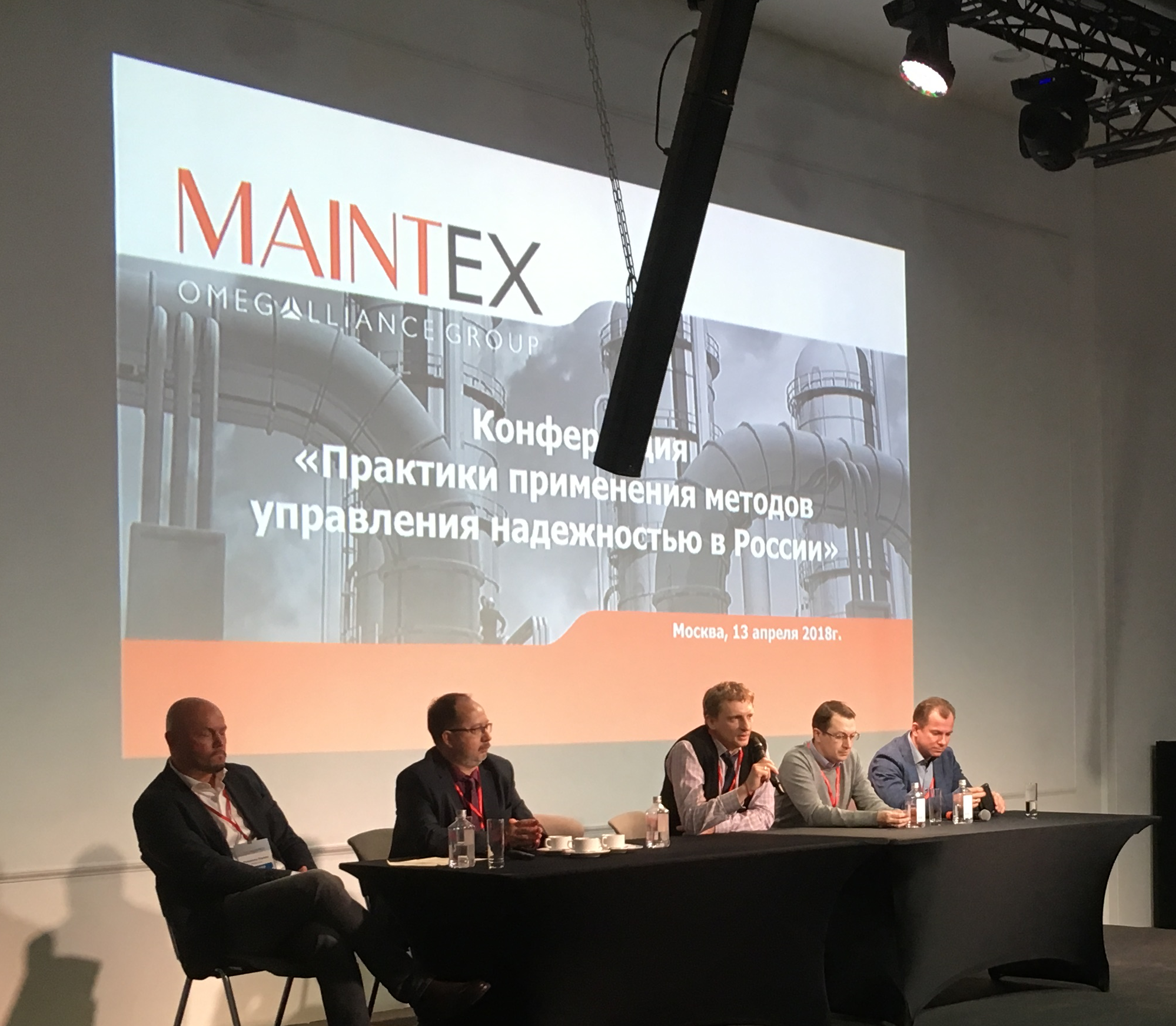On April 13, 2018, Maintex held the third annual conference on reliability management for industrial companies representatives. The event brought together a record number of participants. More than 230 reliability experts, maintenance department managers, operators and other professionals in the field of asset management from more than 70 companies participated in the conference “Practice of Reliability Management Methods Application in Russia”.
In the introduction, Andrey Nadein, OMEGALLIANCE® CEO, on behalf of the organizers, briefly covered strategic asset management topics in the focus of the conference. Roman Romakhin, Maintex Executive Director, continued the presentation and spoke about practical application of asset reliability management principles.
Then the participants were introduced to reports on application of reliability management initiatives at production plants.
Evgeny Tikhonov, Repairs Project Manager at EVRAZ, presented materials on "Transformation of the repair department structure and management methods at EVRAZ based on the example of EVRAZ NTMK". The audience took a particular interest in how the company integrated their own solution for shutdown accounting with SAP PM (Plant Maintenance). The participants appreciated successful transition from the indexed basis method of maintenance works measurement to the resource method, which is still rather an exclusion, not a rule, for Russian companies, in contrast to Western companies using the resource method in over 90% of cases.
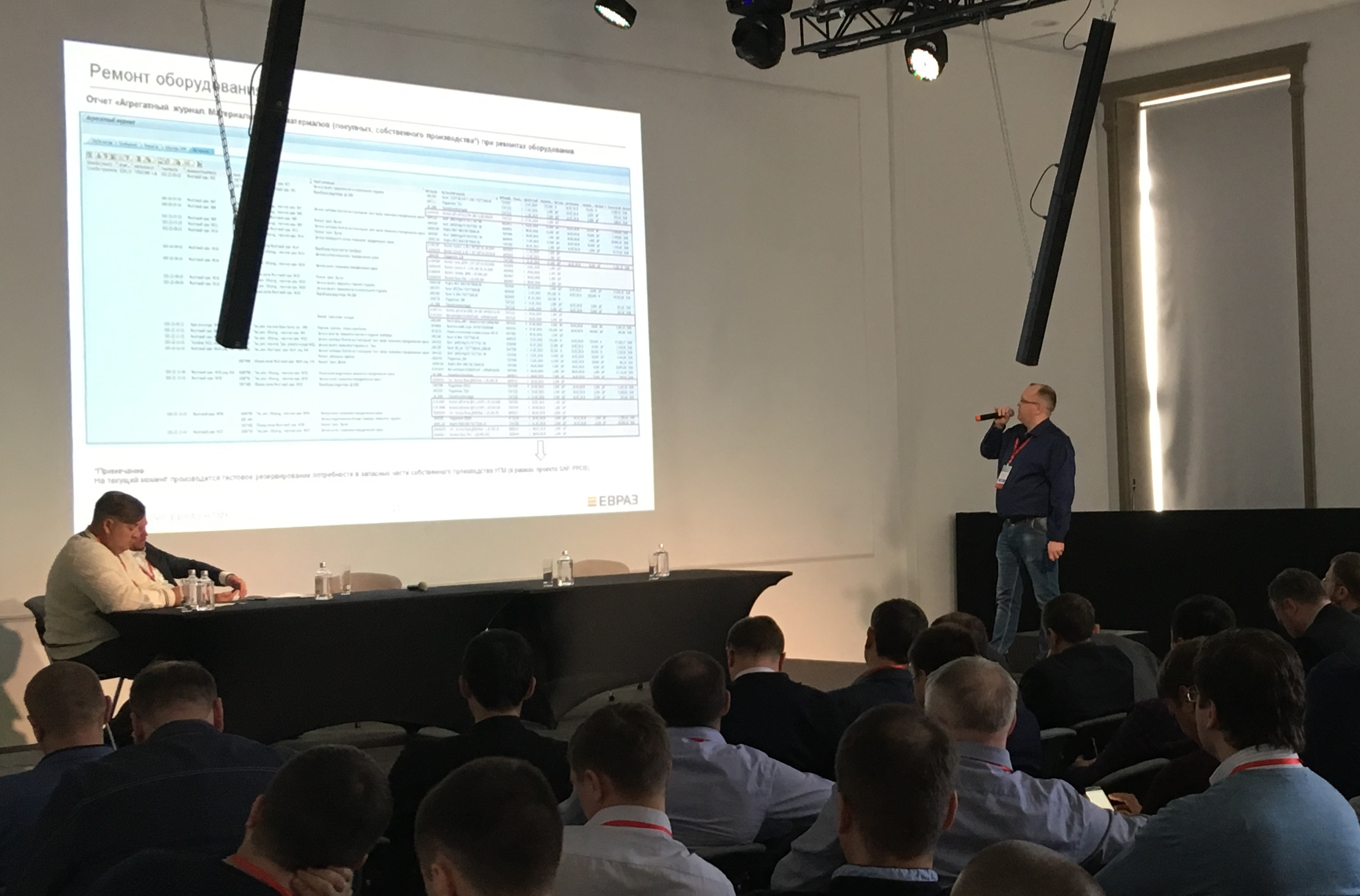
Another interesting example was an integrated aggregate log implemented as a revision of SAP PM and used in all factory shop floors.
The audience was interested in organizational transformation of company’s maintenance department including simplification of the organizational structure and introduction of the Expert function combining functions of chief equipment specialists and reliability engineers, as well as distribution of KIPs between the expert/reliability management group, the planning department, and the work performers.
Among the next maintenance department structure transformation steps, the speaker named stabilization of organizational and process changes implemented in 2017 and early 2018, as well as establishment of requirements for the reliability management information system.
A representative of United Service Company, Chief Reliability Manager Dmitry Sokolov, presented the report “Results of 2017–2018 organizational changes in the maintenance department of United Service Company (PJSC MMK): beginning the path to reliability through investments in personnel’s knowledge and expertise”. The primary consumer of United Service Company’s services is PJSC MMK (Magnitogorsk Iron and Steel Works).
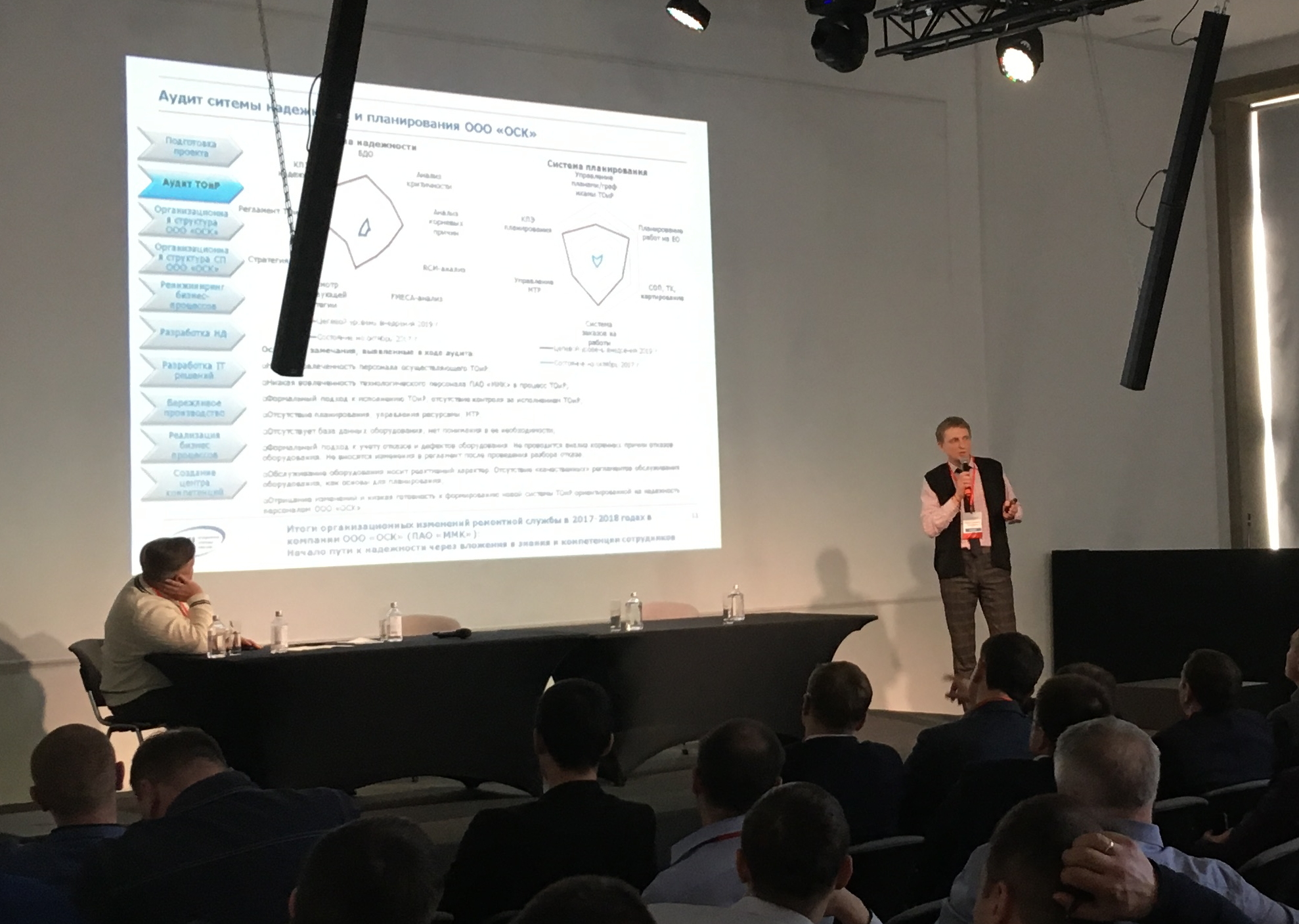
In his presentation, Dmitry highlighted thorough selection and training of reliability and planning specialist from among Company’s employees.
As part of project activities on reliability assessment of the Hot Rolling Mill 2000, not only were the adjusted maintenance programs established, but also regulations were developed to increase reliability of critical equipment and manage costs at the equipment unit level.
Upon project completion in cooperation with Maintex, and as part of the next project “Improvement of the equipment maintenance system at PJSC MMK”, the company undertook to reduce unplanned equipment downtime by 10% (from the level of 2017) and establish an asset ownership cost accounting system in terms of maintenance at the equipment unit level.
The project implemented in cooperation with Maintex gave a momentum for organizational changes in the repair department structure and allocation of planning and reliability management functions.
The report “Program for maintenance transformation at ERG” was presented by Denis Lugovskoy, Managing Director for Maintenance and Repair. The report covered strategic priorities at ERG Group, top-priority tasks of its maintenance directorate, the maintenance transformation road map, and the diagnostics road map up to 2021.
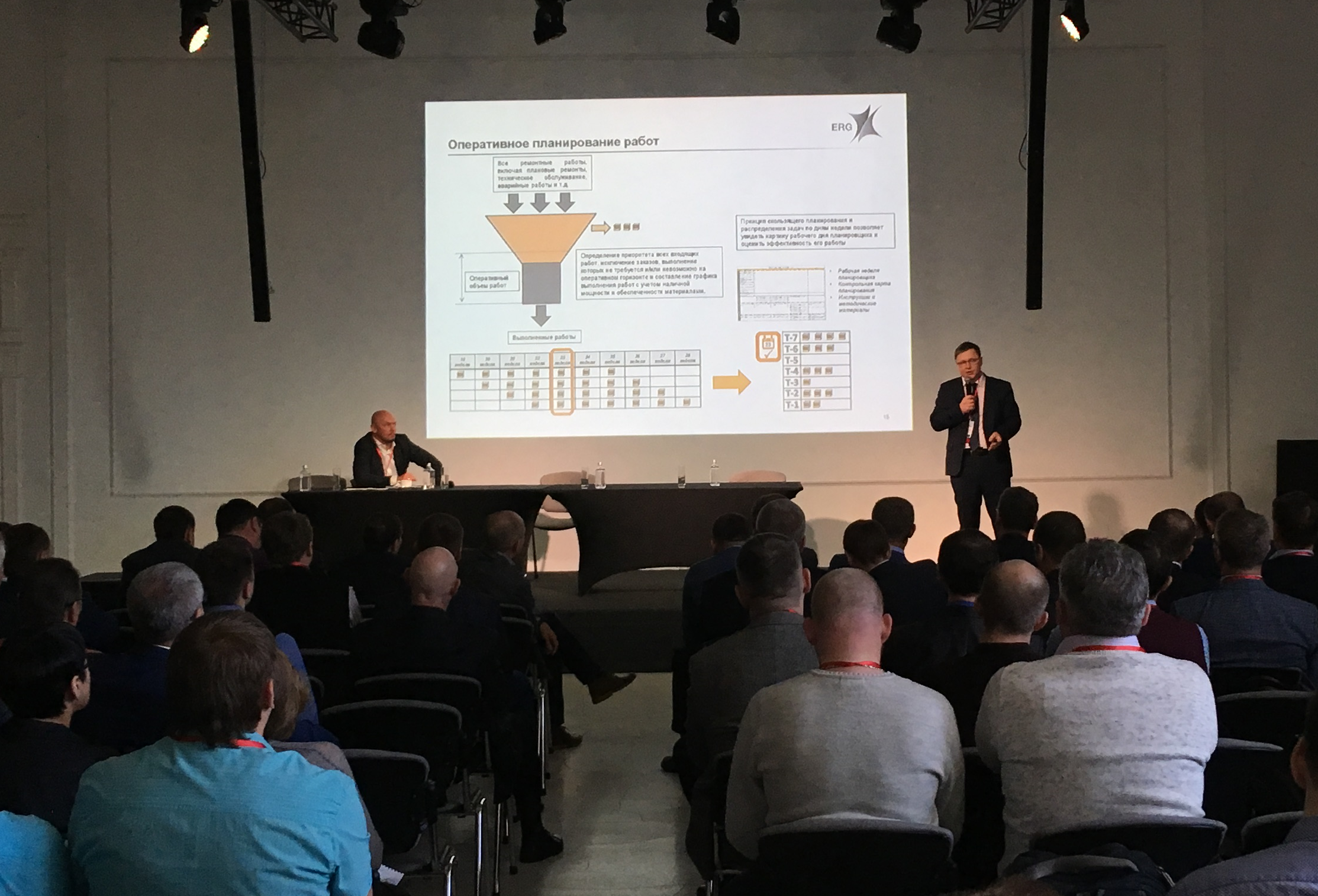
As an achievement, it was noted that in 2017 over 200 FMECA procedures were performed, over 7000 types of failures were analyzed, and over 11000 recommendations and 700 facility-based process diagrams were developed. A reliability structure of 284 specialists was established. Analysis of unplanned downtime along with root cause analysis was implemented on more than 4000 equipment units. Also, lean production tools were implemented.
ERG proved itself as one of the leaders in the field of strategic asset management. On the one hand, the company pays much attention to personnel’s knowledge and expertise: more than 300 specialists learned reliability principles; reliability teams of more than 600 people were formed; and more than 240 maintenance service specialists were trained in the field of lean production. On the other hand, the company applies state-of-the-art technologies in this field: pilot projects on stationary diagnostics, predictive maintenance and predictive analytics aimed to increase availability are being implemented.
Sibur Holding was represented by its Head of Industrial Efficiency Department, Denis Akhmadeev. This time, he spoke about organizational changes in the company related to the matured reliability management function and its increasing impact on maintenance decision taking processes. Chief equipment engineers became chief equipment experts and formed a part of a reliability management panel, responsible for development of maintenance strategies.
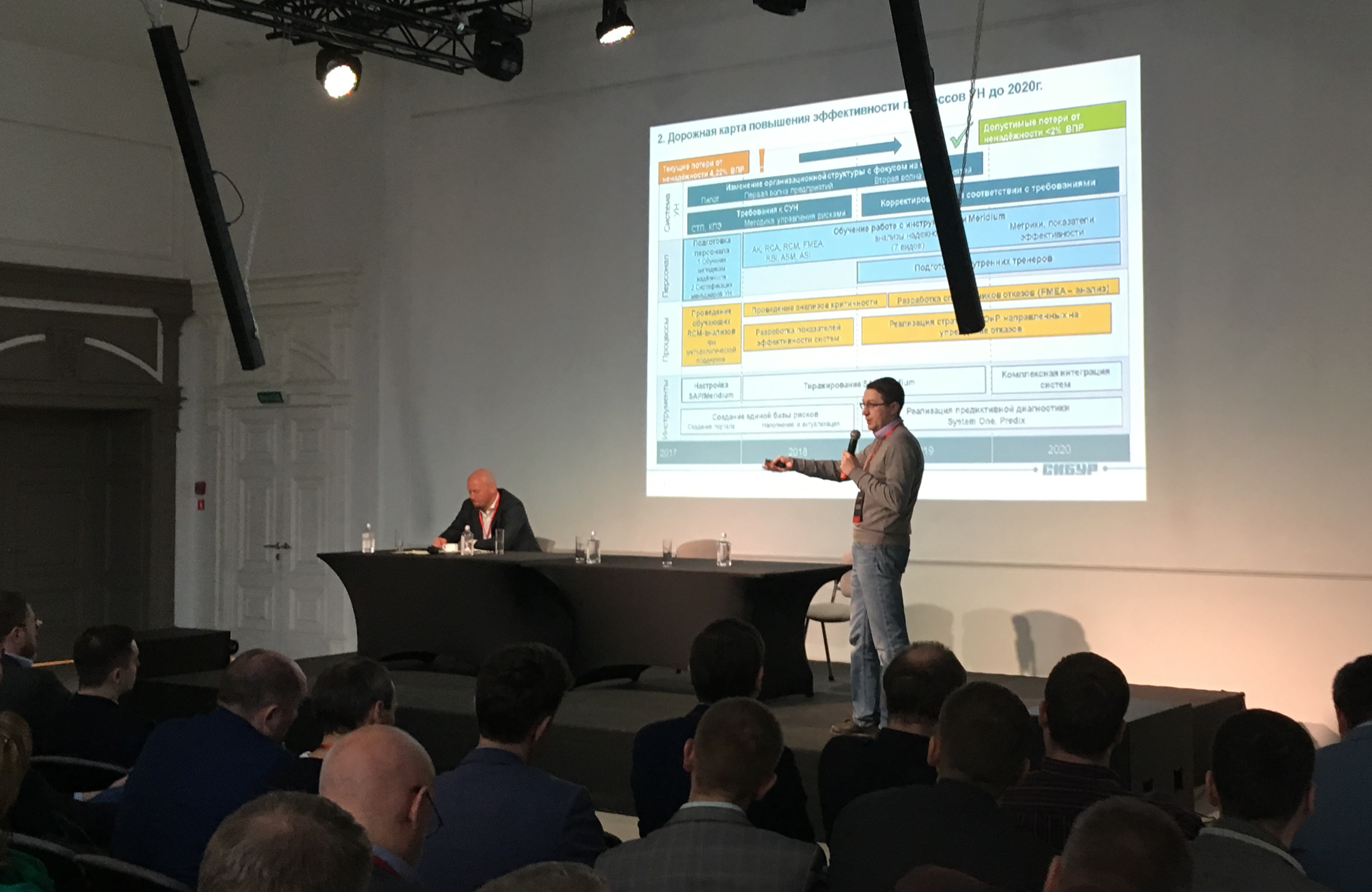
After successful pilot implementation of the Meridium APM (GE APM) solution at the Tomskneftekhim plant, Denis announced the start of the GE APM software replication at nine more holding’s enterprises in next three years. For this purpose, a unified corporate risk matrix was built, site integration into a single system with assignment of access privileges was configured, and maintenance guidelines were formed into a single framework. At the moment, training sessions for users are being held at the Voronezhskiy Syntheticheskiy Kauchuk and Sibur-Himprom sites.
On behalf of the National Oil and Gas Exploration Company of the Kazakhstan Republic, KazMunayGas, Vitaly Izak, Head of Asset Maintenance and Reliability Management Department, and Almaz Burkutbaev, Maintenance and Repair Project Manager, spoke. The speakers presented an action plan developed by Honeywell for increasing the turnaround interval from one to three years. The plan included changes in the organizational structure of the repair management and reliability and integrity support, and implementation of advanced software, including Meridium APM (GE APM) V4.3. The first implementation project of this kind in the CIS is now at the pilot production stage planned for completion by the end of 2018.
Severstal was represented by Konstantin Zyryanov, Chief Reliability Manager of the Repair Administration, and Pavel Smirnov, Chief Manager for Planning System Development. Their presentation stood out as it began with a video where Severstal employees’ children in simple words explained what is the difference between performance, planning and reliability functions and how these functions interact to gain a maximum effect.
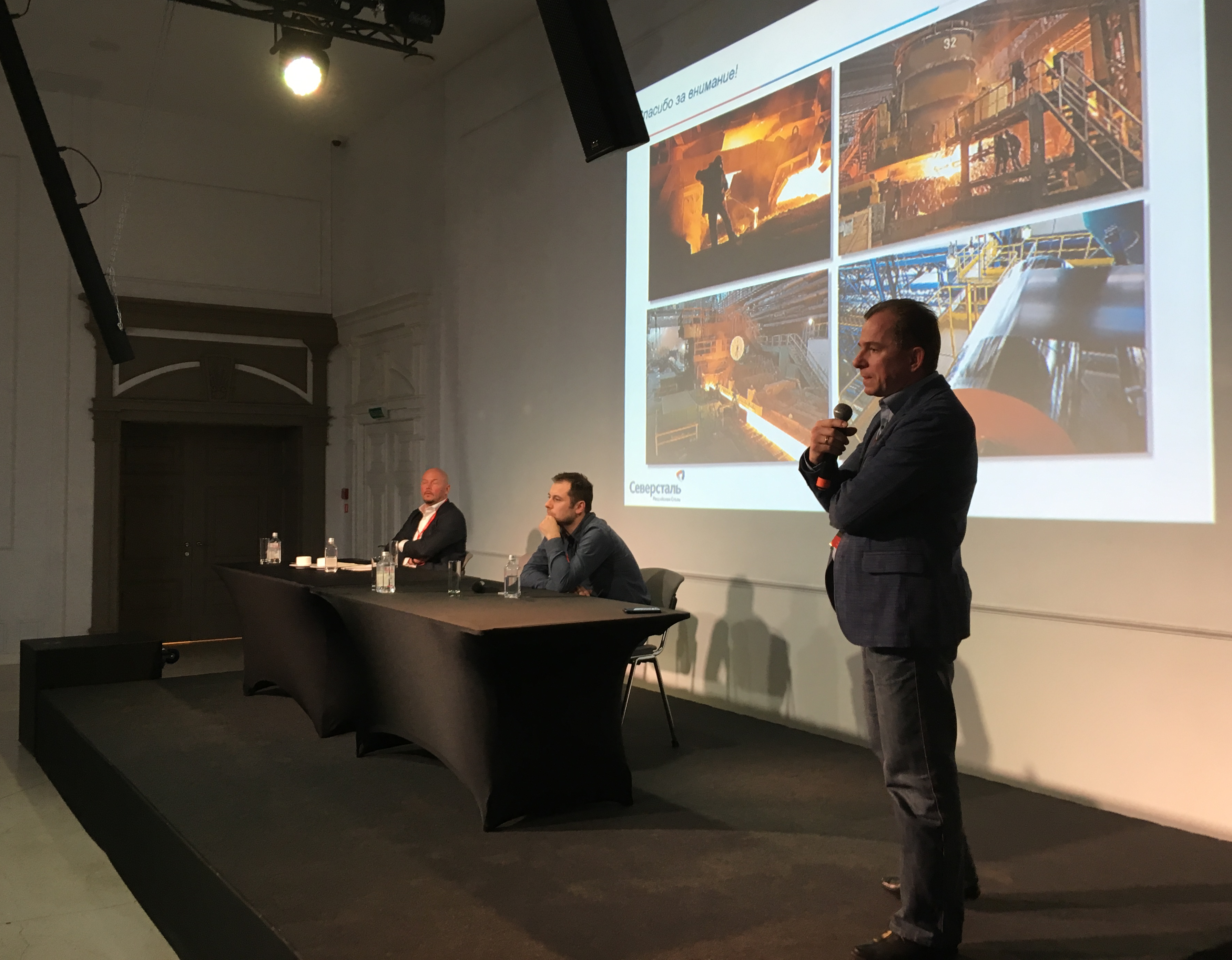
As Severstal is one of the pioneers in application of state-of-the-art methods for asset reliability and efficiency management in Russia, already reaping fruits of such initiatives, company’s results in terms of downtime decrease were of a particular interest to all conference participants. Also, the payback and effects from implementation of the asset reliability and efficiency management function were discussed. It was noted that the effect could be obtained virtually immediately, but without bringing data to order (particularly, without accurate, honest and unbiased registration of downtime and actual cost data broke down by equipment units) it would be impossible to measure this effect.
Work of a reliability engineer was demonstrated in a simple and clear way, listing main tasks of their daily activities that proved their efficiency over several years.
The report “Implementation of a digitalization concept based on the example of CJSC Ryazan Oil Refinery: development of existing and introduction of new reliability initiatives” presented by Igor Sergeev, Head of Reliability Management Department at CJSC Ryazan Oil Refinery, covered directions for development of the reliability and mechanical integrity management function in the company.
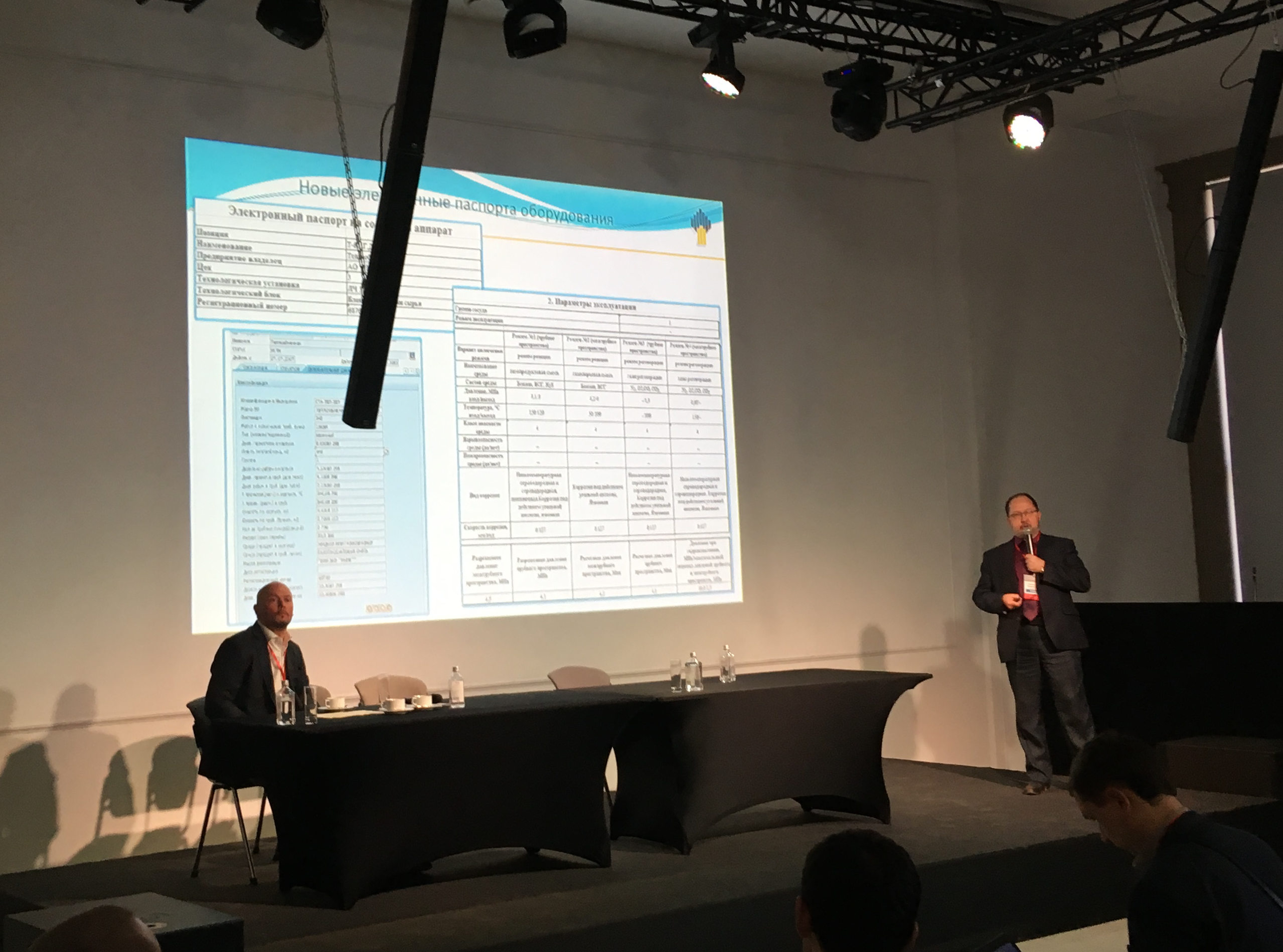
Mr. Sergeev spoke about the first in Russia implementation of a metrological equipment verification and calibration management functionality based on the Meridium APM (GE APM) solution. He also presented the project “Indicators”, an interesting and timely effort to form unified asset health indicators summarizing data on integrity of the equipment, process parameters, equipment maintenance efficiency metrics and life cycle cost parameters. Both projects being implemented at the moment aroused great interest among the audience.
Within the framework of Rosneft’s general digitalization strategy, a project was started on creation of a unified reference solution for equipment maintenance management closely integrated with the technical equipment control system. It is going to be a unified solution for all company’s oil refineries. The reference solution combines maintenance capabilities of SAP S4/HANA, functionality of GE Meridium V4, and significant revisions aimed to implement standards which enable to increase the turnaround interval at oil refineries in Russia to 3 years.
In conclusion of the conference, Roman Romakhin, Maintex Executive Director, presented the report “Evolution of methods, practices and tools for asset efficiency management. Looking into the future”. In his presentation, Roman tried to focus on all current tendencies in development of methods, approaches and techniques for asset management. Undoubtedly, predictive analytics is the next step in technology development which enables troubleshooting at earlier stages. Roman briefly covered solutions present on the market and described the experience of Maintex in this field.
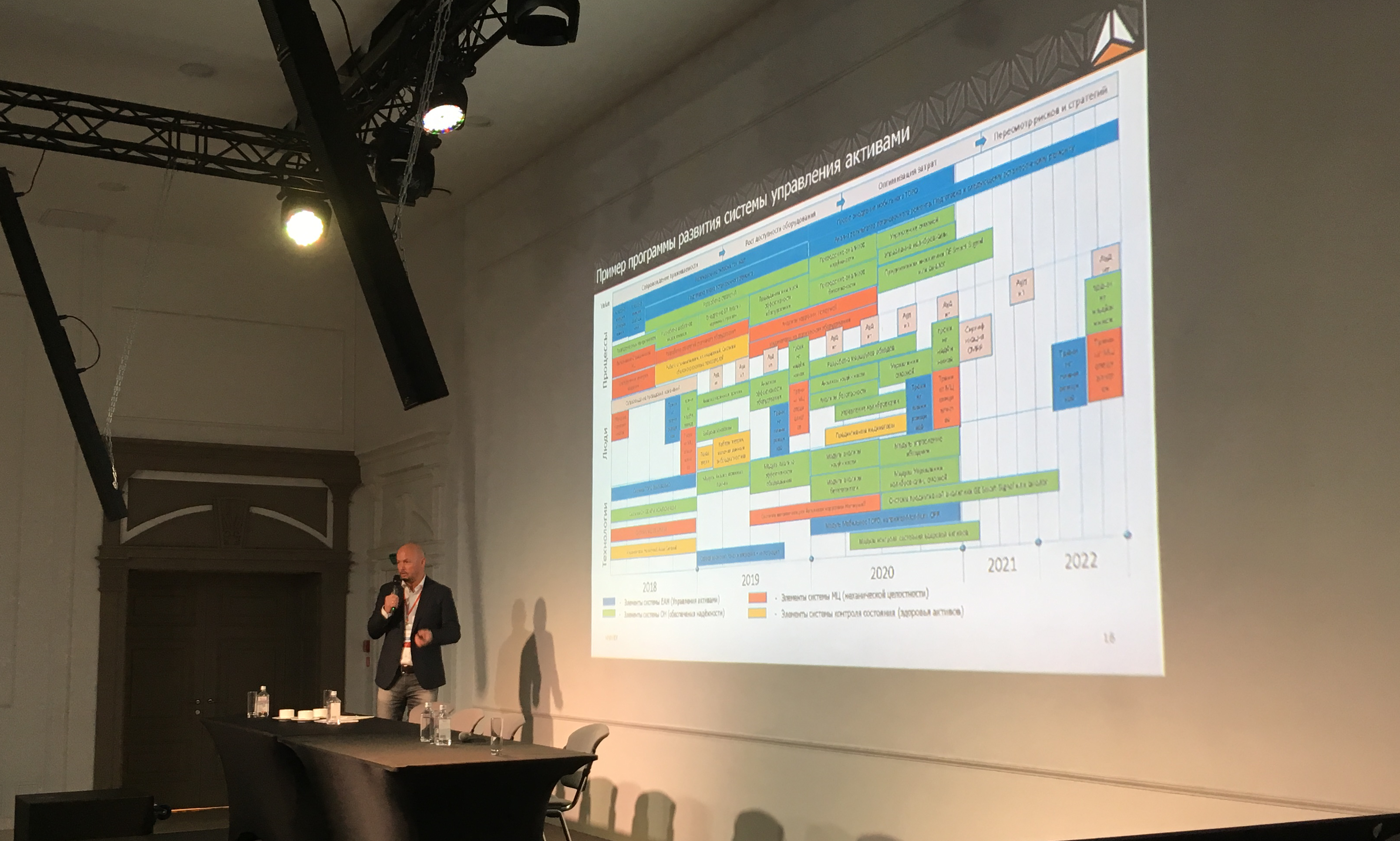
Roman paid particular attention to survival rate of the reliability management function at customers’ sites and told about importance of personnel’s knowledge and expertise.
It is in the asset management field where ubiquitous economy digitalization can have the maximum effect. Roman touched upon the topic of digital asset management and how solutions by Schneider Electric help modern production enterprises establish an integrated operating control center aggregating data on asset health and production processes.
After the conference, a truly heated Q&A session took place that continued on the sidelines for 2 hours.
